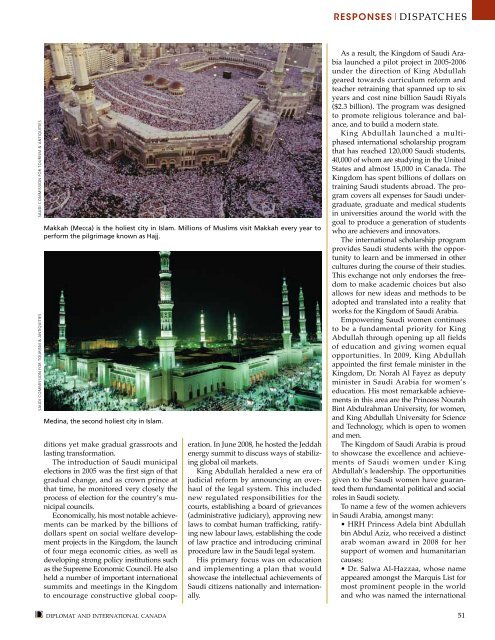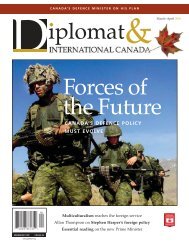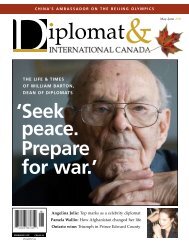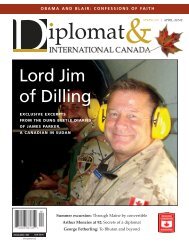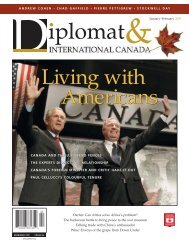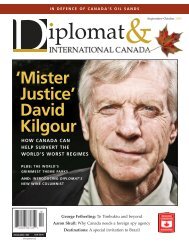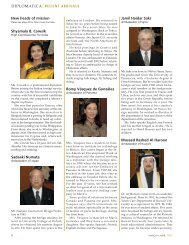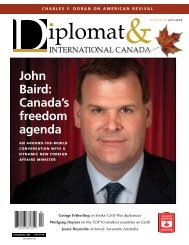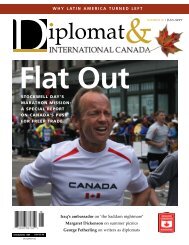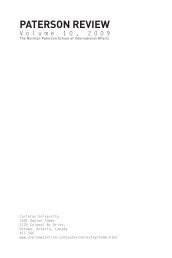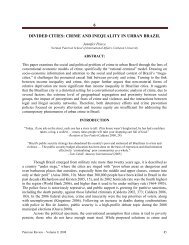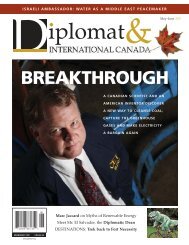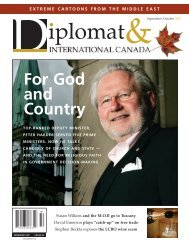the new petro power paradigm - Diplomat Magazine
the new petro power paradigm - Diplomat Magazine
the new petro power paradigm - Diplomat Magazine
You also want an ePaper? Increase the reach of your titles
YUMPU automatically turns print PDFs into web optimized ePapers that Google loves.
esponses|Di spatches<br />
Saudi Commission for Tourism & Antiquities Saudi Commission for Tourism & Antiquities<br />
Makkah (Mecca) is <strong>the</strong> holiest city in Islam. Millions of Muslims visit Makkah every year to<br />
perform <strong>the</strong> pilgrimage known as Hajj.<br />
Medina, <strong>the</strong> second holiest city in Islam.<br />
ditions yet make gradual grassroots and<br />
lasting transformation.<br />
The introduction of Saudi municipal<br />
elections in 2005 was <strong>the</strong> first sign of that<br />
gradual change, and as crown prince at<br />
that time, he monitored very closely <strong>the</strong><br />
process of election for <strong>the</strong> country’s municipal<br />
councils.<br />
Economically, his most notable achievements<br />
can be marked by <strong>the</strong> billions of<br />
dollars spent on social welfare development<br />
projects in <strong>the</strong> Kingdom, <strong>the</strong> launch<br />
of four mega economic cities, as well as<br />
developing strong policy institutions such<br />
as <strong>the</strong> Supreme Economic Council. He also<br />
held a number of important international<br />
summits and meetings in <strong>the</strong> Kingdom<br />
to encourage constructive global cooperation.<br />
In June 2008, he hosted <strong>the</strong> Jeddah<br />
energy summit to discuss ways of stabilizing<br />
global oil markets.<br />
King Abdullah heralded a <strong>new</strong> era of<br />
judicial reform by announcing an overhaul<br />
of <strong>the</strong> legal system. This included<br />
<strong>new</strong> regulated responsibilities for <strong>the</strong><br />
courts, establishing a board of grievances<br />
(administrative judiciary), approving <strong>new</strong><br />
laws to combat human trafficking, ratifying<br />
<strong>new</strong> labour laws, establishing <strong>the</strong> code<br />
of law practice and introducing criminal<br />
procedure law in <strong>the</strong> Saudi legal system.<br />
His primary focus was on education<br />
and implementing a plan that would<br />
showcase <strong>the</strong> intellectual achievements of<br />
Saudi citizens nationally and internationally.<br />
As a result, <strong>the</strong> Kingdom of Saudi Arabia<br />
launched a pilot project in 2005-2006<br />
under <strong>the</strong> direction of King Abdullah<br />
geared towards curriculum reform and<br />
teacher retraining that spanned up to six<br />
years and cost nine billion Saudi Riyals<br />
($2.3 billion). The program was designed<br />
to promote religious tolerance and balance,<br />
and to build a modern state.<br />
King Abdullah launched a multiphased<br />
international scholarship program<br />
that has reached 120,000 Saudi students,<br />
40,000 of whom are studying in <strong>the</strong> United<br />
States and almost 15,000 in Canada. The<br />
Kingdom has spent billions of dollars on<br />
training Saudi students abroad. The program<br />
covers all expenses for Saudi undergraduate,<br />
graduate and medical students<br />
in universities around <strong>the</strong> world with <strong>the</strong><br />
goal to produce a generation of students<br />
who are achievers and innovators.<br />
The international scholarship program<br />
provides Saudi students with <strong>the</strong> opportunity<br />
to learn and be immersed in o<strong>the</strong>r<br />
cultures during <strong>the</strong> course of <strong>the</strong>ir studies.<br />
This exchange not only endorses <strong>the</strong> freedom<br />
to make academic choices but also<br />
allows for <strong>new</strong> ideas and methods to be<br />
adopted and translated into a reality that<br />
works for <strong>the</strong> Kingdom of Saudi Arabia.<br />
Em<strong>power</strong>ing Saudi women continues<br />
to be a fundamental priority for King<br />
Abdullah through opening up all fields<br />
of education and giving women equal<br />
opportunities. In 2009, King Abdullah<br />
appointed <strong>the</strong> first female minister in <strong>the</strong><br />
Kingdom, Dr. Norah Al Fayez as deputy<br />
minister in Saudi Arabia for women’s<br />
education. His most remarkable achievements<br />
in this area are <strong>the</strong> Princess Nourah<br />
Bint Abdulrahman University, for women,<br />
and King Abdullah University for Science<br />
and Technology, which is open to women<br />
and men.<br />
The Kingdom of Saudi Arabia is proud<br />
to showcase <strong>the</strong> excellence and achievements<br />
of Saudi women under King<br />
Abdullah’s leadership. The opportunities<br />
given to <strong>the</strong> Saudi women have guaranteed<br />
<strong>the</strong>m fundamental political and social<br />
roles in Saudi society.<br />
To name a few of <strong>the</strong> women achievers<br />
in Saudi Arabia, amongst many:<br />
• HRH Princess Adela bint Abdullah<br />
bin Abdul Aziz, who received a distinct<br />
arab woman award in 2008 for her<br />
support of women and humanitarian<br />
causes;<br />
• Dr. Salwa Al-Hazzaa, whose name<br />
appeared amongst <strong>the</strong> Marquis List for<br />
most prominent people in <strong>the</strong> world<br />
and who was named <strong>the</strong> international<br />
diplomat and international canada 51


